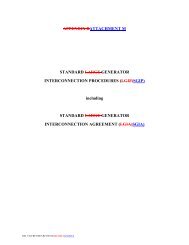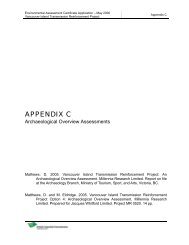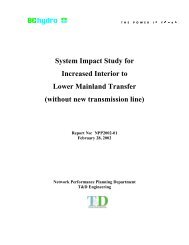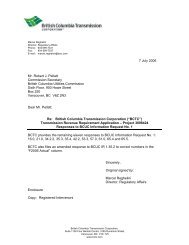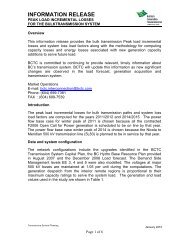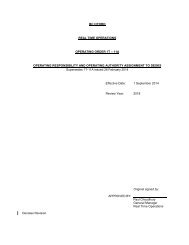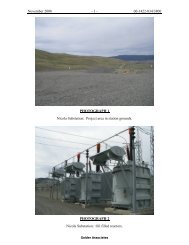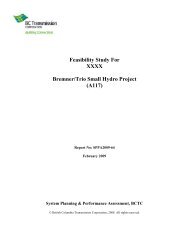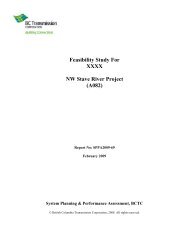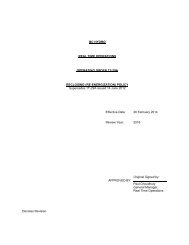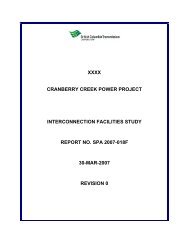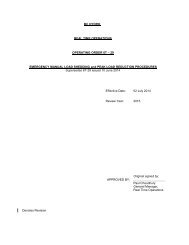Evidence on the Adequacy of First Nations Consultation - BC Hydro ...
Evidence on the Adequacy of First Nations Consultation - BC Hydro ...
Evidence on the Adequacy of First Nations Consultation - BC Hydro ...
Create successful ePaper yourself
Turn your PDF publications into a flip-book with our unique Google optimized e-Paper software.
DRAFT REPORT: Rights and Title Interests in <strong>the</strong> Columbia Valley Transmissi<strong>on</strong> Project Area<br />
So <strong>the</strong>y talked it over and <strong>the</strong>n <strong>the</strong>y started over, you know, <strong>the</strong> women.<br />
And <strong>the</strong>y took <strong>the</strong> same route, you know, through <strong>the</strong> Columbia River.<br />
So <strong>the</strong>y got, <strong>the</strong>y had <strong>the</strong>ir camp at Kinbasket Lake, you know. And<br />
when <strong>the</strong>y arrived, <strong>the</strong> mosquitoes were so thick that <strong>the</strong>y had to be all<br />
covered….[mosquito incident]<br />
And <strong>the</strong>n <strong>the</strong> next year, by golly, <strong>the</strong>y said <strong>the</strong>y were going home, you<br />
see. And my grandfa<strong>the</strong>r said, well, it was so nice here and everything<br />
was plentiful and <strong>the</strong>y better stay. But oh no, <strong>the</strong>y just got ready and <strong>the</strong>y<br />
went [back to Shuswap Lake country] and left <strong>the</strong> men folks. So <strong>the</strong>n<br />
<strong>of</strong> course, afterwards, <strong>the</strong> men had to follow and <strong>the</strong> next year <strong>the</strong>y came<br />
over and <strong>the</strong>y said <strong>the</strong>y were going to take a shorter route to come over.<br />
……………….<br />
But anyway, <strong>the</strong>y came through <strong>the</strong>re, where <strong>the</strong> railroad came through<br />
afterwards [through Three-Valley Gap] and it was shorter, all right. But<br />
<strong>the</strong>n <strong>the</strong>y brought horses al<strong>on</strong>g and <strong>the</strong>re were places where <strong>the</strong>y had to<br />
make ladders, you know, over <strong>the</strong> cliffs and <strong>the</strong>y brought <strong>the</strong>ir... Well,<br />
not straight drop but you know, difficult for horses to come over. 157 Well,<br />
<strong>the</strong>n <strong>the</strong>y'd make <strong>the</strong>se sort <strong>of</strong> ladder things and <strong>the</strong>y tie <strong>the</strong>m toge<strong>the</strong>r<br />
with willows and <strong>the</strong>y'd bring <strong>the</strong> horses over this and it too <strong>the</strong>m so l<strong>on</strong>g<br />
to come over.<br />
So <strong>the</strong>n <strong>the</strong>y settled around <strong>the</strong> Kinbasket Lakes and <strong>the</strong>n <strong>the</strong> men folks<br />
would come down to this valley you know. And <strong>on</strong>e summer <strong>the</strong>y saw<br />
tracks <strong>of</strong>, you know, people had been around. So <strong>of</strong> course <strong>the</strong>y were<br />
worried that it may be <strong>the</strong> Prairie Indians, you see. So <strong>the</strong>y were a little<br />
leery and <strong>the</strong>y went back to camp and told <strong>the</strong> o<strong>the</strong>rs about it. So I think<br />
it was in <strong>the</strong> fall, in <strong>the</strong> late fall, that <strong>the</strong>y were coming down <strong>the</strong> slough<br />
with <strong>the</strong>ir bows and arrows. And <strong>the</strong>n all <strong>of</strong> a sudden <strong>the</strong> Kootenays came<br />
out <strong>of</strong> <strong>the</strong> bush and my great-grandfa<strong>the</strong>r wanted to, well, kill <strong>the</strong>m, I<br />
guess. And his s<strong>on</strong> took away <strong>the</strong> arrow, <strong>the</strong> bow and arrow from him,<br />
and told him <strong>the</strong>se people are, haven't shown any signs <strong>of</strong> being hostile.<br />
So <strong>the</strong>n he didn't like it when <strong>the</strong>y took away his bow and arrow and he<br />
ran back to camp. And so when <strong>the</strong>se Kootenays, <strong>the</strong>y lined up in fr<strong>on</strong>t <strong>of</strong><br />
<strong>the</strong>m and <strong>of</strong> course <strong>the</strong>y got in line <strong>on</strong> this side, <strong>the</strong>mselves. And so <strong>on</strong>e<br />
<strong>of</strong> <strong>the</strong> Kootenay showed his arrow, you know, like he wanted to give it to<br />
this Shuswap. So <strong>the</strong> Shuswap exchanged arrows with him and <strong>the</strong>n <strong>the</strong>y<br />
all did <strong>the</strong> same down <strong>the</strong> line. And so <strong>the</strong>n <strong>the</strong>y tried to make signs to<br />
157 To this view should be added <strong>the</strong> comments <strong>of</strong> an old man met by Alexander Ross while near Nakusp in<br />
1825: “I and several <strong>of</strong> my people have likewise been to <strong>the</strong> ‘She-waps’ which lies northwest from this, but <strong>the</strong> road<br />
leading <strong>the</strong>re is two days journey from this and it takes eight days to accomplish. We have no horses, nor is <strong>the</strong><br />
country suitable for <strong>the</strong>m.”Alexander Ross (1849). Adventurers <strong>of</strong> <strong>the</strong> <strong>First</strong> Settlers <strong>on</strong> <strong>the</strong> Oreg<strong>on</strong> or Columbia<br />
River . . .with an account <strong>of</strong> some Indian Tribes <strong>on</strong> <strong>the</strong> Coast <strong>of</strong> <strong>the</strong> Pacific. Smith, Elder, and Company: L<strong>on</strong>d<strong>on</strong>.<br />
Bouchard & Kennedy Research C<strong>on</strong>sultants Page 34<br />
Page 37 <strong>of</strong> 200



